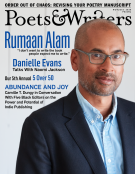In her ingeniously structured debut collection, If the Body Allows It (University of Nebraska Press, September 2020), Megan Cummins intersperses stories about the book’s protagonist, Marie, with pieces the character herself has written. Marie’s attempt to reckon with both her autoimmune disease and the death of her father, who struggled with addiction, flickers throughout the fictions she writes; in many of them characters face the disconnect between their lives and the lives they imagined for themselves. (“But I was always falling in love with a future that required more heart than I had,” says one character.) Cummins’s resulting collection, which is by turns humorous and poignant, depicts how guilt and regret can warp how we understand and write about one another and ourselves.

Top: Megan Cummins (Credit: Francis Cosgriff)
Cummins submits to magazines when she connects so much with its contents that a piece pops into her head months later. She recalls being captivated by the work of Jericho Brown, Sara Majka, and D. Wystan Owen in early issues of A Public Space, which published her first print story, “We Are Holding Our Own,” in 2013. Cummins later went on to become the managing editor of the publication, which is based in Brooklyn, New York, comes out three times a year, and is part of a larger nonprofit that, under the leadership of Brigid Hughes, also publishes books. Cummins spent several months intensively revising and learning how to scrutinize her story with Yiyun Li, a contributing editor of the nonprofit. (“I had to find a way to allow for a character’s confusion about himself and his identity but not allow for my confusion as a writer in the crafting of that character,” Cummins says.) A recent issue of the magazine featured woodcuts by Zarina, fiction by Jamel Brinkley, nonfiction by Taylor Plimpton, and poetry by Yanyi. Magazine submissions are open until April 15.
In 2013, Cummins came across One Teen Story, which at the time published young adult stories written by adults, including many authors Cummins admires: Aimee Bender, Francesca Lia Block, Julie Buntin, and Michelle Hart. One Teen Story now only publishes teen writers, and, like its sister journal, One Story, prints small-pamphlet issues that include a single story. “What I admire most about the journal, then and now, is that each story captures a different intensity about being young,” says Cummins, who published her story “Aerosol” with One Teen Story in 2016. The journal comes out around three times a year and is open to submissions for its Teen Writing Contest until November 20; the winners will receive $500 and publication.
“You can lose track of time for hours, exploring all kinds of writing,” says Cummins of Guernica, the volunteer-run online magazine of politics and arts that regularly publishes poetry, fiction, nonfiction, reportage, interviews, and more. In 2016, Cummins published an essay about her father’s death and her diagnosis with systemic lupus with the outlet; her experience editing the piece with Jonathan Lee, a contributing editor at the time, led her to the structure of If the Body Allows It, as well as one of its through lines, the connection between autoimmunity and guilt. Fittingly, Guernica also ran a story from Cummins’s book, “Flour Baby,” in September. Submissions in all genres are open via Submittable.
Cummins was drawn to Joyland, which bills itself as a “journal in multiple time zones,” in part for its focus on place. “When I write, place itself becomes a source of conflict, sometimes without my realizing it at first,” she says. “Characters want to stay or go. They want the place to be like it used to be, or like it never was.” Cummins published the book’s final story in Joyland, where editor Kyle Lucia Wu encouraged her to be “clear and bold.” Wu is one of several editors at the journal; in 2020 editor in chief Michelle Lyn King relaunched Joyland, and in an effort to ensure it was “not a journal just for those in New York City, Los Angeles, or even the United States,” brought on more than ten new editors based in Baltimore, Honolulu, London, Mumbai, and Toronto, among other cities. The journal publishes fiction and nonfiction at least once a week online and organizes its work by region. Submissions are open year-round in all genres via Submittable.
Taking inspiration from the “Joycean idea that an epiphany is the moment when ‘the soul of the commonest object…seems to us radiant,’” the biannual Epiphany has published poetry, fiction, nonfiction, and art since 2001. “I get the sense the editors are looking for work that thrills and challenges them, without preconceived notions of what they want,” says Cummins, whose story “Skin” was posted on Epiphany’s website in early September. The most recent issue of Epiphany centers on borders and features work by Roy G. Guzmán, Kimiko Hahn, and Lena Valencia, among others. Submissions are open in all genres via Submittable until November 15.
Dana Isokawa is the senior editor of Poets & Writers Magazine.









